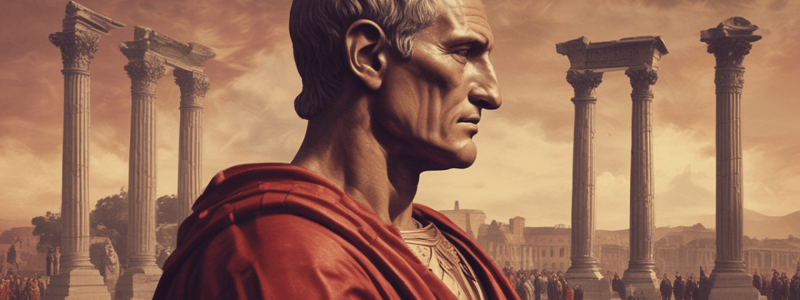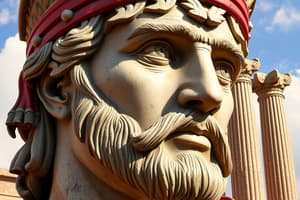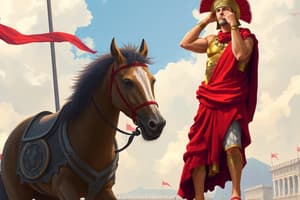Podcast
Questions and Answers
What was Caesar's primary motivation for expanding Roman citizenship?
What was Caesar's primary motivation for expanding Roman citizenship?
- To increase his own military power
- To create a new social class in Rome
- To reduce the power of the Roman Senate
- To solidify Roman rule and settle new territories (correct)
What was the problem with the Roman calendar before Caesar's reforms?
What was the problem with the Roman calendar before Caesar's reforms?
- It was based on a lunar cycle
- It was only used in Rome
- It was not based on the solar cycle (correct)
- It was too long
Caesar's reforms to the Roman Senate included:
Caesar's reforms to the Roman Senate included:
- Dissolving the Senate
- Giving the Senate more power
- Reducing the size of the Senate
- Expanding the size of the Senate and who it represented (correct)
What was the primary difference between the Roman calendar and the Julian Calendar?
What was the primary difference between the Roman calendar and the Julian Calendar?
What was the result of Caesar's political maneuvering in the Senate?
What was the result of Caesar's political maneuvering in the Senate?
What was the purpose of the first year of the Julian Calendar having 455 days?
What was the purpose of the first year of the Julian Calendar having 455 days?
Who was allowed to add days to the Roman calendar before Caesar's reforms?
Who was allowed to add days to the Roman calendar before Caesar's reforms?
What innovation is credited to Caesar in relation to the Julian Calendar?
What innovation is credited to Caesar in relation to the Julian Calendar?
What was a major issue in the Roman Republic during Julius Caesar's time?
What was a major issue in the Roman Republic during Julius Caesar's time?
Why did armies fight in the Roman Republic?
Why did armies fight in the Roman Republic?
What was Julius Caesar's family background?
What was Julius Caesar's family background?
What was one of Julius Caesar's early challenges?
What was one of Julius Caesar's early challenges?
What position did Julius Caesar hold in 59 B.C.?
What position did Julius Caesar hold in 59 B.C.?
Where did Julius Caesar serve as governor from 58 to 51 B.C.?
Where did Julius Caesar serve as governor from 58 to 51 B.C.?
What can be said about Julius Caesar's military career?
What can be said about Julius Caesar's military career?
Flashcards are hidden until you start studying
Study Notes
The Declining Republic
- The Roman Republic was in a state of conflict, with the rich getting richer and the poor getting poorer.
- The Republic was in a perpetual state of war, with armies fighting for their generals' wealth and status rather than for their country.
Julius Caesar's Early Life
- Julius Caesar was born into a patrician family, but his family did not have massive wealth.
- Despite this, Caesar managed to climb the political ladder in Rome, achieving various positions.
Caesar's Political Career
- Caesar held positions including:
- Quaestor (Ancient Roman accountant) in 68 B.C.
- Curule aedile (responsible for maintaining the city and keeping the people entertained) in 65 B.C.
- Pontifex maximus (chief priest of Rome) in 65 B.C.
- Praetor (dual role as military leader and judge) in 62 B.C.
- Consul (one of two leaders of Rome) in 59 B.C.
- Dictator for Life in 44 B.C.
Expanding and Reforming the Republic
- Caesar was a highly accomplished general, never losing a war despite losing battles.
- He conquered Gaul (modern-day France) from 58 to 51 B.C. and expanded the Roman Republic into present-day Belgium.
- Caesar expanded Roman citizenship and actively worked to settle new territories around the Republic.
- He continued to push Roman influence through the Mediterranean into Europe.
The Senate
- The Roman Senate was similar to the Senate in the United States today, with elected members representing the Roman people and creating new laws.
- Caesar increased government transparency by publishing Senate activities.
- He expanded the size of the Senate and extended who the Senate represented.
- Caesar passed a law through the Senate to prevent extortion.
Julian Calendar
- Before Caesar's reign, the Roman calendar had 355 days, based on the lunar cycle.
- Caesar reformed the calendar to base it on the solar cycle, with 365 1/4 days.
- He introduced the concept of leap year to account for the extra 1/4 day.
- The Julian Calendar was used worldwide until the 1500s, when the Gregorian Calendar made improvements.
Studying That Suits You
Use AI to generate personalized quizzes and flashcards to suit your learning preferences.





